The hike up to Mount Everest Base Camp is known to be one of the most beautiful and inspiring treks in the world. The great thing about the trek is that anyone who has the desire (and fitness) to take part of the trek can do so.
One of the major considerations though when deciding how to take part, is the overall Everest Base Camp trek cost. Since there are several different ways to go about the trek, the costs can differ greatly. The options vary from doing everything on your own to joining a fully organized tour.
Throughout this guide I will be going into detail about all the various costs to consider depending on what way you decide to take part. I hope by the end of reading this, you will be well on your way to taking on the Everest Base Camp trek for yourself.
* Affiliate Disclosure: This post may contain affiliate links, which means I may receive a commission if you make a purchase through the links provided, at no additional cost to you. Thanks for supporting the work I put into TripTins!
1) Everest Base Camp Trek Overview
Before we get into Everest Base Camp Trek costs, let’s first talk about what the Everest Base Camp (EBC) trek is all about.
For most people, the trek is an 11 day hiking journey through the beautiful landscape of Sagarmatha National Park in the Himalayas of Nepal.
The trek starts in Lukla and heads up to Everest Base Camp over the course of 8 days. It then takes 3 days to retrace your steps back from base camp and to Lukla. On day 12, you fly back out of Lukla to end your time on the trail.
While there are other ways to go about a trek in the region (such as the Three Passes Trek), this guide will be going over the costs of a standard Everest Base Camp trek itinerary.
Below is a day by day breakdown of what the trek is all about, followed by an overview of the distance and elevation gain to expect.
Day 1: Fly to Lukla & trek Lukla to Phakding
Day 2: Phakding to Namche Bazaar
Day 3: Namche Bazaar Acclimatization
Day 4: Namche Bazaar to Tengboche
Day 5: Tengboche to Dingboche
Day 6: Dingboche Acclimatization
Day 7: Dingboche to Lobuche
Day 8: Lobuche to Gorak Shep & Gorak Shep to Everest Base Camp
Day 9: Kala Patthar & Gorak Shep to Pheriche
Day 10: Pheriche to Namche Bazaar
Day 11: Namche Bazaar to Lukla
Day 12: Fly from Lukla to Kathmandu
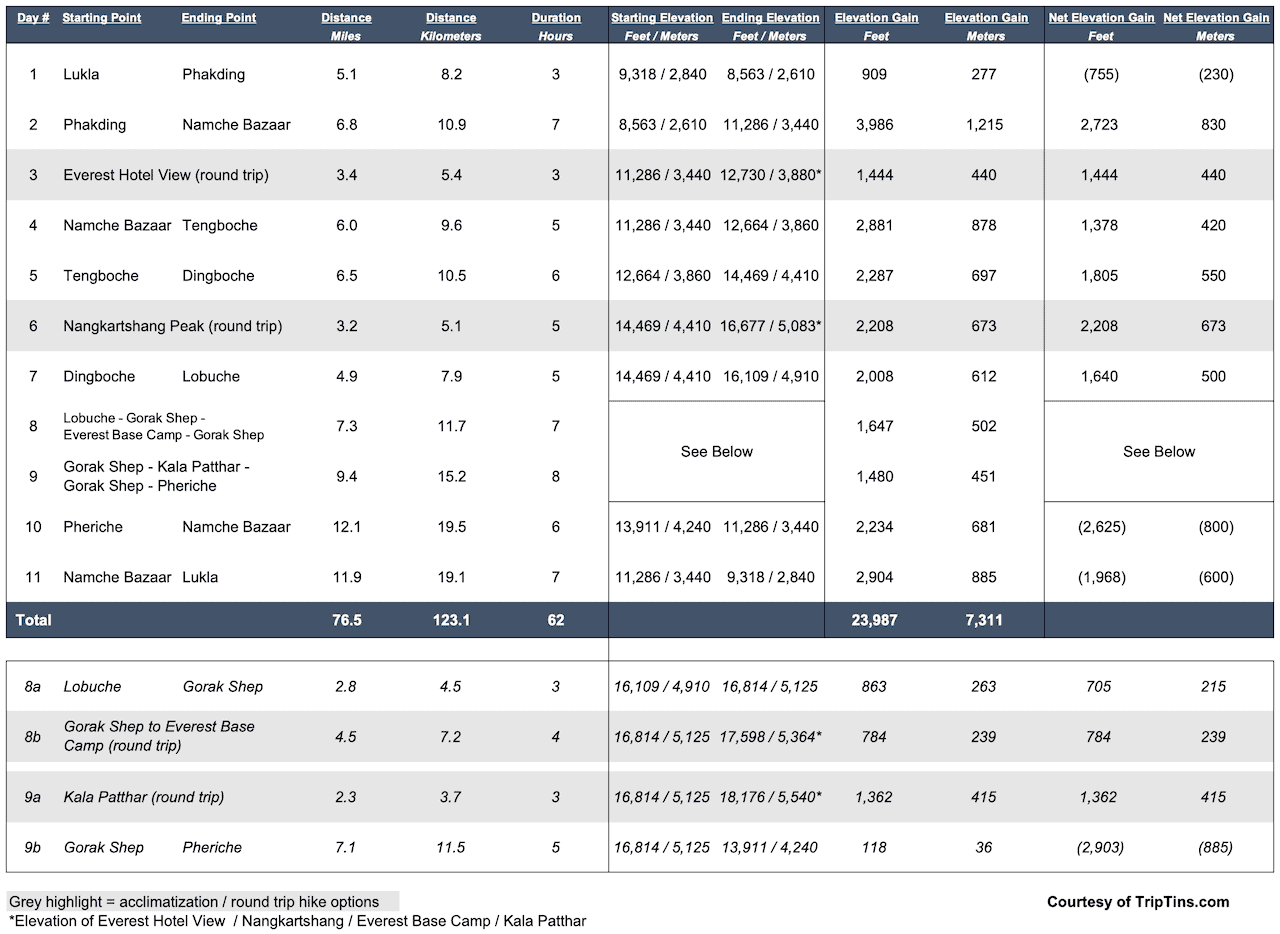
2) Breakdown of Everest Base Camp Trek Options
As mentioned there will be several different ways to go about a hike to Everest Base Camp. Choosing which option will depend on various factors, with costs being one of the main ones to consider.
Below are most of the main Everest Base Camp trek options to choose from:
Fully Organized Trek
The most expensive option out there will be a fully organized trek. These types of treks will take care of everything for you from the moment you land.
You can expect this to be an all inclusive type of option, so there is very little that you will need to worry about along the way. Such treks would include things like:
› Transportation to and from Kathmandu airport
› Accommodation & Food in Kathmandu before and after the trek
› Day tour in Kathmandu before or after the trek
› Flights to/from Lukla
› Trekking permits
› English speaking guides
› Porters to carry your bags
› Teahouse accommodation
› Teahouse food
With that said though, there are really two main ways to go about a full organized trek. You can either sign up with a foreign company or a local Nepalese company.
A) Fully Organized Trek (Foreign)
There are many foreign companies that run all-inclusive type Everest Base Camp treks. These can be organized by big names such as National Geographic, Adventure Consultants, or Mountain Madness.
Expect these to be on the highest end of the spectrum with western guides, a trusted name backing the trek, and an ease of communication from start to finish.
B) Fully Organized Trek (Local)
On the other hand, you can also sign up for a fully organized trek with a local Nepalese outlet. While much of the included items will be the same, you will probably not have a western guide with you and might not have the same type of personal comfort level with a foreign company.
Independent Trek with Support
If you don’t want to have that all inclusive type of option but also don’t want to do the trek fully independently, then there is a middle ground here.
You can opt to do an independent trek with support from a local (or locals). When I say support, I mean having a guide, porter guide, or porter along with you for the duration of the trek.
This is a great option if you don’t want to join a group tour but still want a local hiking alongside you.
From a cost perspective, you will want to consider all of the costs as if you were doing the trek independently and add in the costs for either a guide, porter guide, or porter to join you.
A) Independent Trek with Local Guide
A guide will be an English speaking local who will walk alongside you for the duration of the trail. They will not carry your bags, but they will be able to answer your questions and teach you more about the region along the way.
If you are comfortable carrying all of your own gear and are just more interested in learning more about the region and have a guide with you, this option works well.
+$30 per day
B) Independent Trek with Local Porter Guide
A porter guide is a mix between a guide and a porter. They do not speak great English – just enough to get by. But they will carry your bag throughout the duration of the trail.
This type of option is perfect for those that don’t want to carry too much weight on them and want to ask basic questions and communicate along the way.
+$20 per day
C) Independent Trek with Local Porter
Porters will simply carry your bag for you during the trek. They speak little to no English and will probably not understand questions you may try to ask them. Having just a porter is a great option for those that don’t want to carry much weight and are comfortable doing this type of trekking on their own to an extent.
+$15 per day
Note: you can also hire multiple locals if you want an English speaking guide + a porter to carry your gear.
Fully Independent Trek
The last of the major options here is to have a fully independent trek from start to finish. This means you will need to take care of all costs, logistics, and other considerations on your own.
You will of course need to be comfortable carrying your own gear and navigating the trail. Since this option means you will be fully on your own, it will also come in as the cheapest of all options.
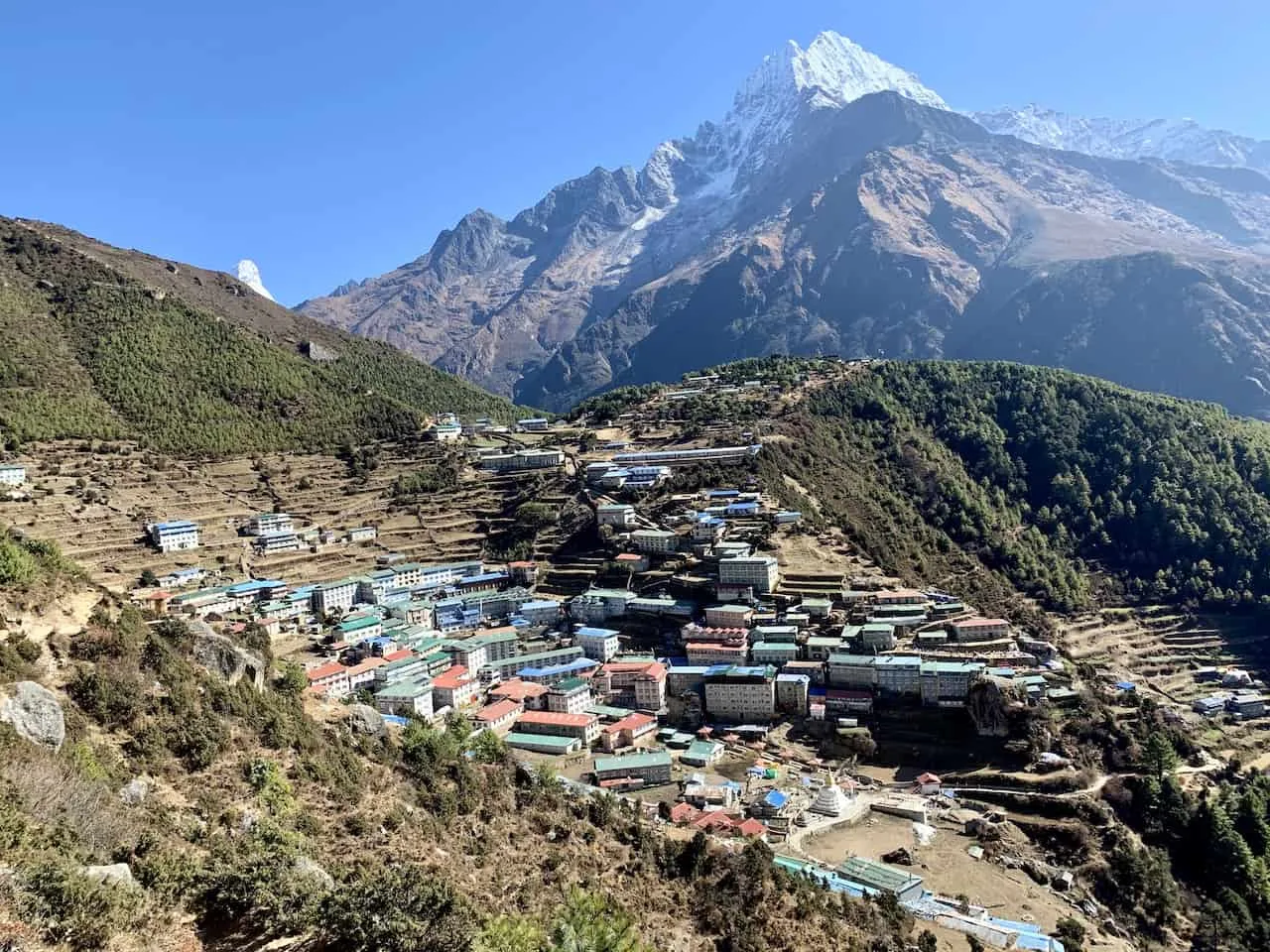
3) How Much Does an Everest Base Camp Trek Cost?
Below you can find the average Everest Base Camp trek cost for the various options I laid out.
There can certainly be a wide range of costs depending on tour options + additional add-ons (more on these soon).
Fully Organized Trek
Foreign Company: $2,000+ (+visas & travel insurance)
Local Company: $1,500 (+visas & travel insurance)
Independent Trek with Support
With a Guide: $1,365
With a Porter Guide: $1,285
With a Porter: $1,230
Prices above consider the $1,065 for a fully independent trek + the costs for the guide/porter guide/porter
Fully Independent Trek
Independent Trek: $1,065
* The $1,065 includes everything from the moment you land until the moment you depart. So, it does not only include your time on the trail, but also your time in Kathmandu. I have also included travel insurance in the total cost.*
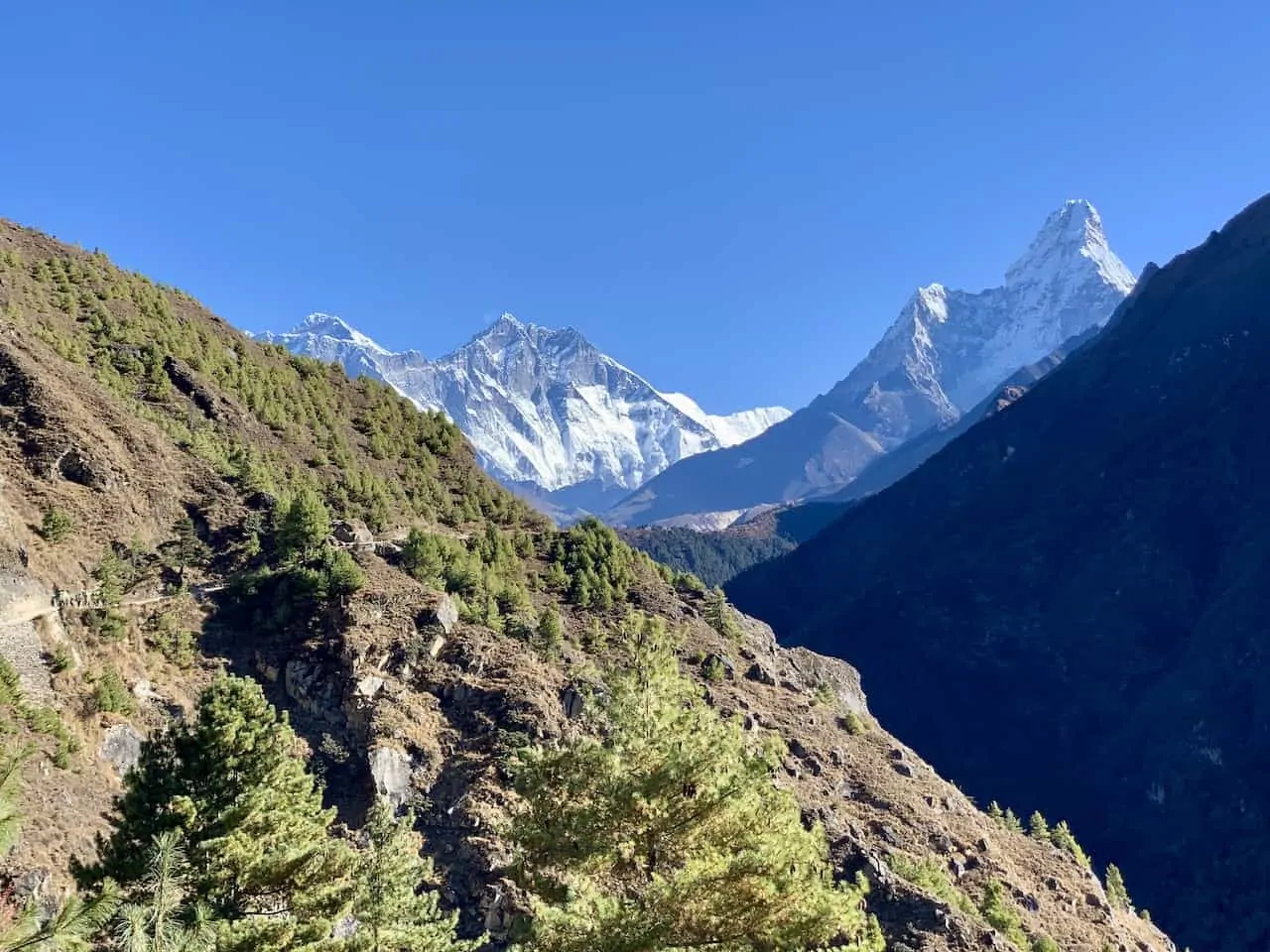
4) Everest Base Camp Trek Cost Breakdown
If you are opting for a fully organized trek, there will not be many additional costs to consider during a trip. Nearly everything is taken care of for you throughout your time in Nepal. You still will want to add travel insurance and Nepal permits to a trip like that.
However, if you do opt to do a fully independent or semi-independent trek, you will need to understand the breakdown of the costs and where your money will go towards.
Standard Costs
→ Nepal Visa
→ Taxis to/from Airport
→ Kathmandu Accommodation & Food
→ Flight to/from Lukla
→ EBC Trek Accommodation
→ EBC Trek Food
→ EBC Permits
→ EBC Insurance
Additional Amenities
→ Charging Electronics
→ Hot Showers
→ Internet
Below I will breakdown each one of these costs to give you a better sense of what the dollar figures will be.
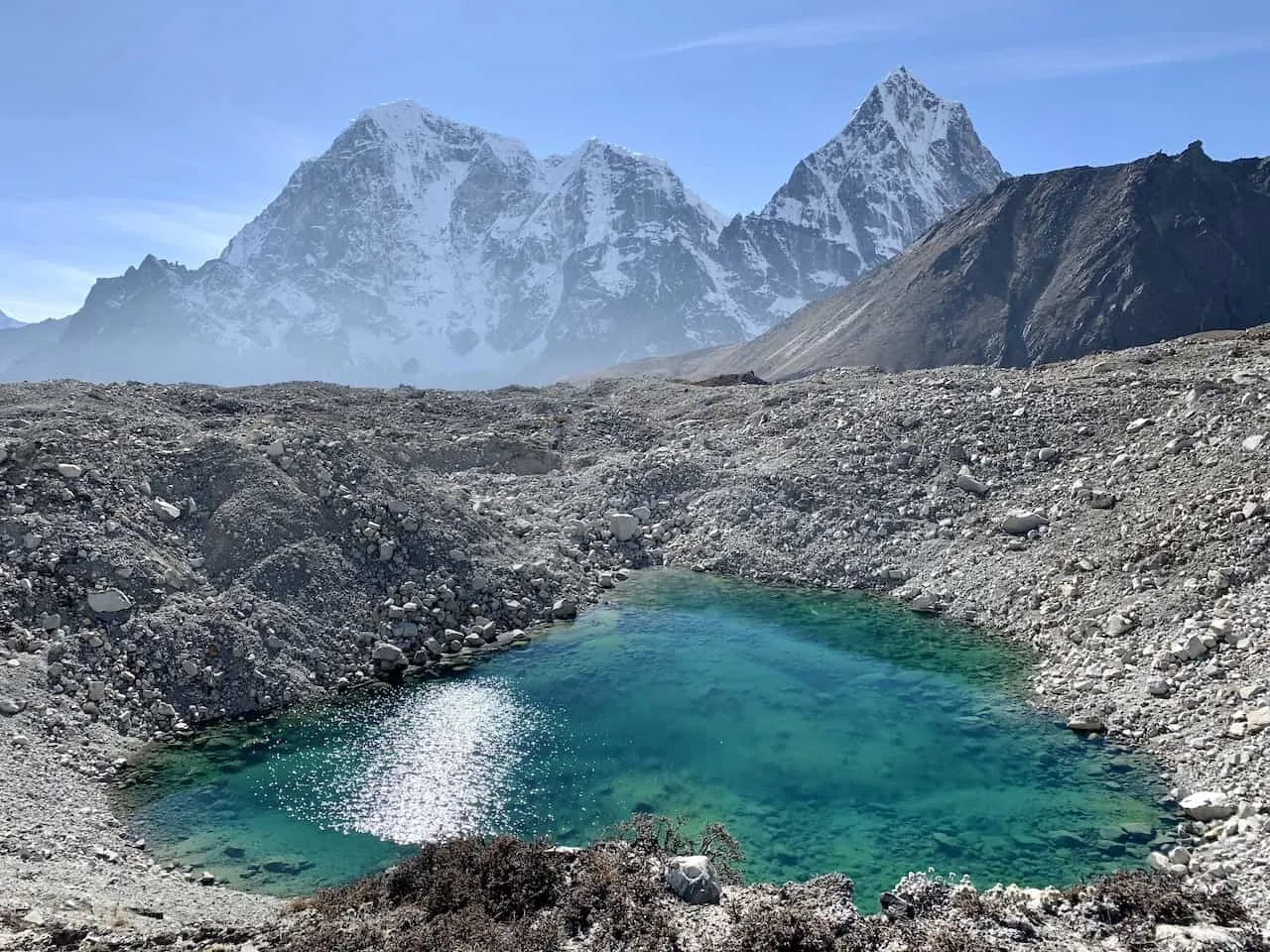
Nepal Visa
Total Cost: $30 USD
In order to enter Nepal, you must pay for a visa on arrival (at least for a US citizen). There are a few different options to choose from including a 15 day ($30), 30 day ($50), and 90 day ($125).
If you are taking part of the Everest Base Camp trek, you are mostly likely going to go for the 15 or 30 day. On the other hand, if you are looking to stay longer in Nepal, you may need to purchase a longer visa on arrival.
Taxis to/from Airport
Total Cost: $32 USD
There will be 4 taxis costs to consider when arriving and departing from Kathmandu. This is because you will be heading from/to the airport at the beginning/end of your trip, in addition to the flights to/from Lukla.
These one way taxis should be around $8 to/from the Kathmandu Airport. The other option here is to take the public bus, which should cost around $0.25.
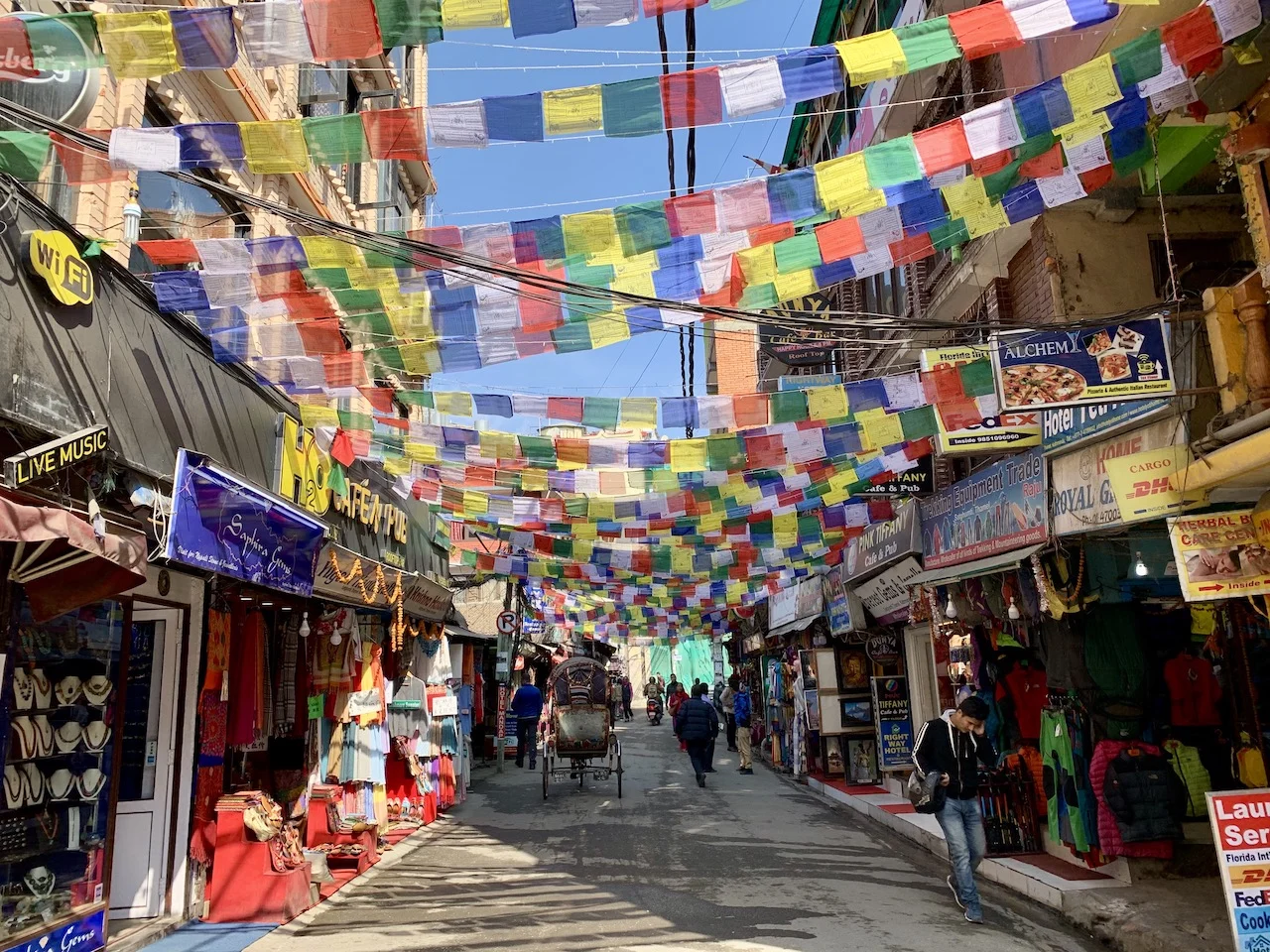
Kathmandu Accommodation & Food
Total Cost: $135 USD (but can vary greatly)
It is a pretty standard choice to stay in Kathmandu for a day or two before and after your trek. This is mostly for you to just make any last minute preparations, get over jet lag, and leave some days in case the flight to/from Lukla gets delayed.
On average though, let’s say you stay 3 nights altogether in Kathmandu at the beginning and end of your trip.
During these three nights/days you will need to pay for your accommodation and food. These costs can vary widely depending on what type of hotel and food options you end up choosing.
A pretty standard room though should cost around $25 per night with each meal costing around $10. So, let’s say with 3 nights and 6 meals, your total comes to $135 USD.
Not considered here is whether you want to take a day tour around Kathmandu visiting various temples and sites in the area.
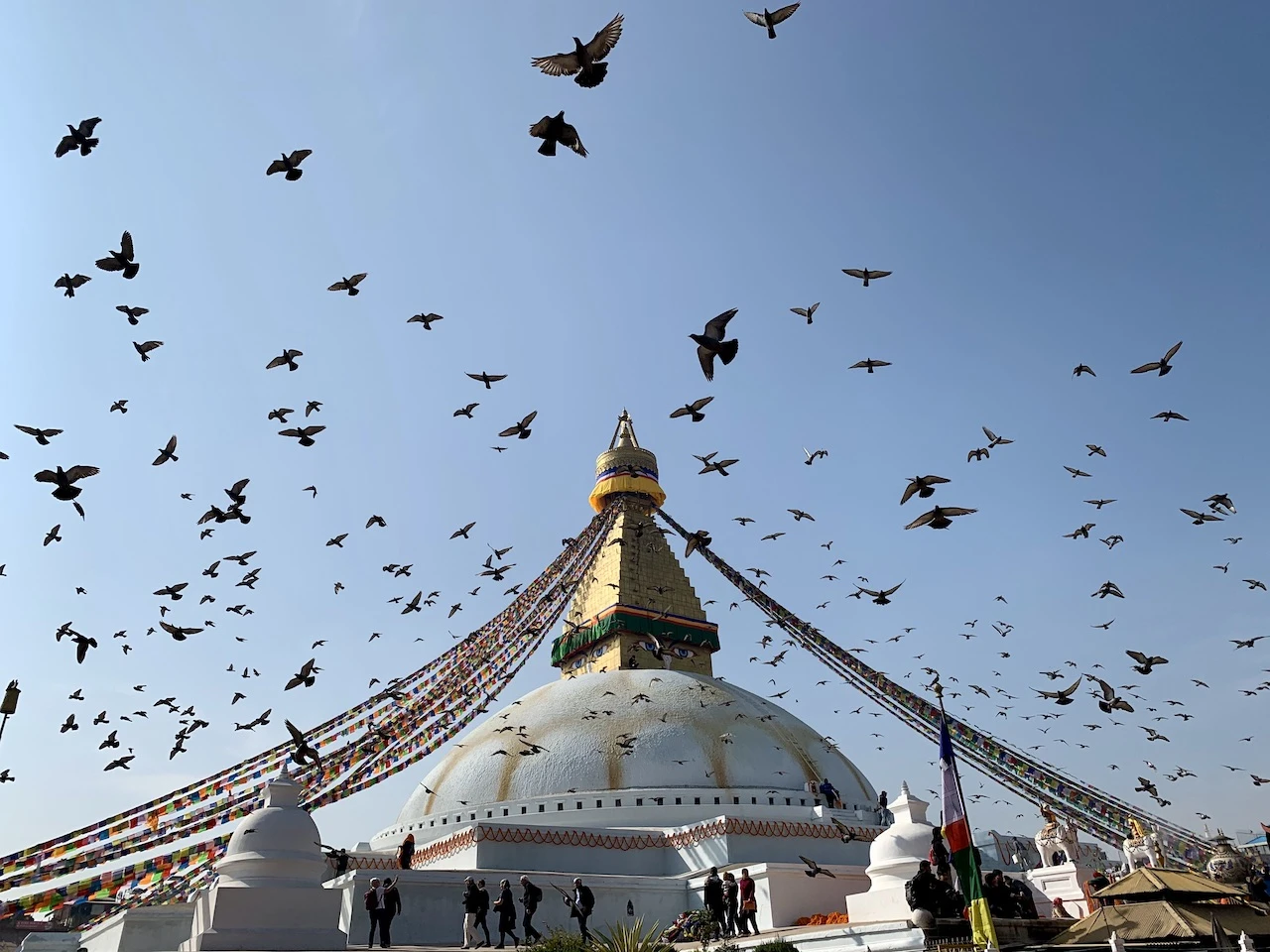
Transport to Lukla
Total Cost: $360 USD
Lukla is the starting village of the Everest Base Camp trek and where the closest airport is to EBC. Although flying is the most popular of options here, there are some additional ways to get yourself to Lukla.
Airplane
The round trip airfare from Kathmandu to Lukla will cost $360. This is by far the most expensive individual purchase of your journey in Nepal. There are a few airlines that make this route including Yeti Airlines and Tara Airlines.
Note that flights to/from Lukla can get cancelled due to poor weather. There is not much leeway when it comes to the Lukla airport so conditions must be ideal for the planes to land and take off.
Important Note: Flights sometimes only depart from Ramechhap, a 5-6 hour drive from Kathmandu. Be sure to check the latest flight schedules to better understand if Kathmandu offers departures during your trip.
» Check out this Kathmandu to Lukla Flight guide to learn more
Helicopter Option
If you are looking for a more stress free way of getting to Lukla, you can opt for a helicopter ride. Helicopters have a bit more wiggle room when it comes to weather and are more guaranteed to take off.
With a helicopter though, expect to pay nearly triple the cost with a round trip flight costing $1,000 ($500 each way).
Bus/Jeep + Trek Option
Instead of flying to Lukla, you can also make a longer journey out of it by taking a jeep/bus to Jiri or Salleri. From each one of these will add another 3-4 days trekking as you hike your way to Lukla.
A bus ticket can cost as little as $10 while renting a jeep can be closer to $150. However, you must also consider the extra costs of accommodation and food on this trekking portion prior to Lukla.
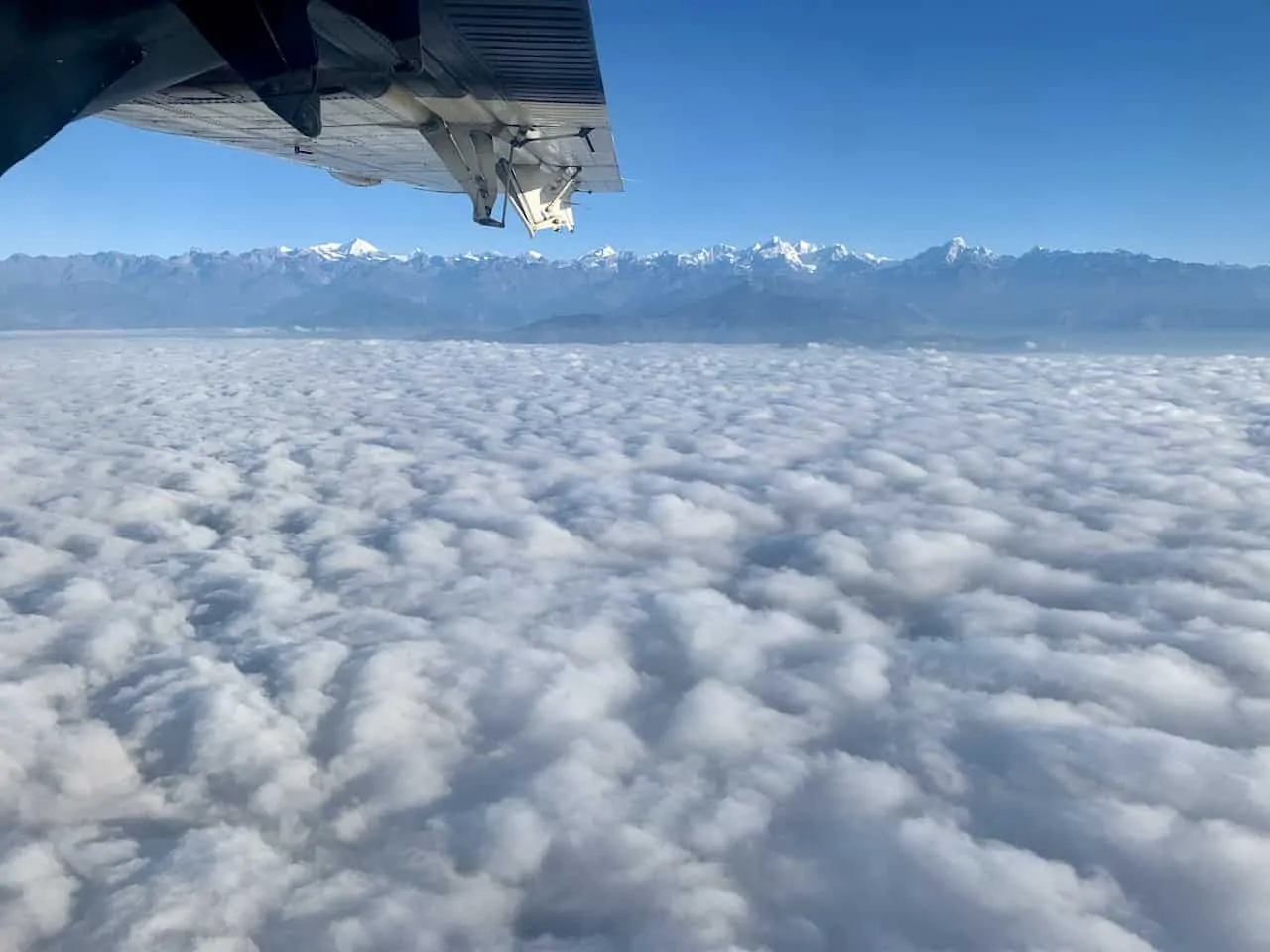
EBC Trek Accommodation
Total Cost: $55 USD
Once you have made it to Lukla, you will now be staying in local teahouses throughout the Everest Base Camp trek. The standard trek will be 11 days of hiking and then flying out on day 12.
So, overall you are looking at 11 nights of teahouse accommodation. All the accommodation charges are $5 per night. The one exception was Lobuche, where it was closer to $7 per night. There will be options in certain places, where the prices can vary, but this should give you a pretty solid idea of what to expect.
→ It is very important to note that the prices indicated are only if you are also eating the majority of your meals at the teahouse. Most of the time this won’t really be an issue since it is not like there are restaurants in these villages (besides Lukla/Namche Bazaar).
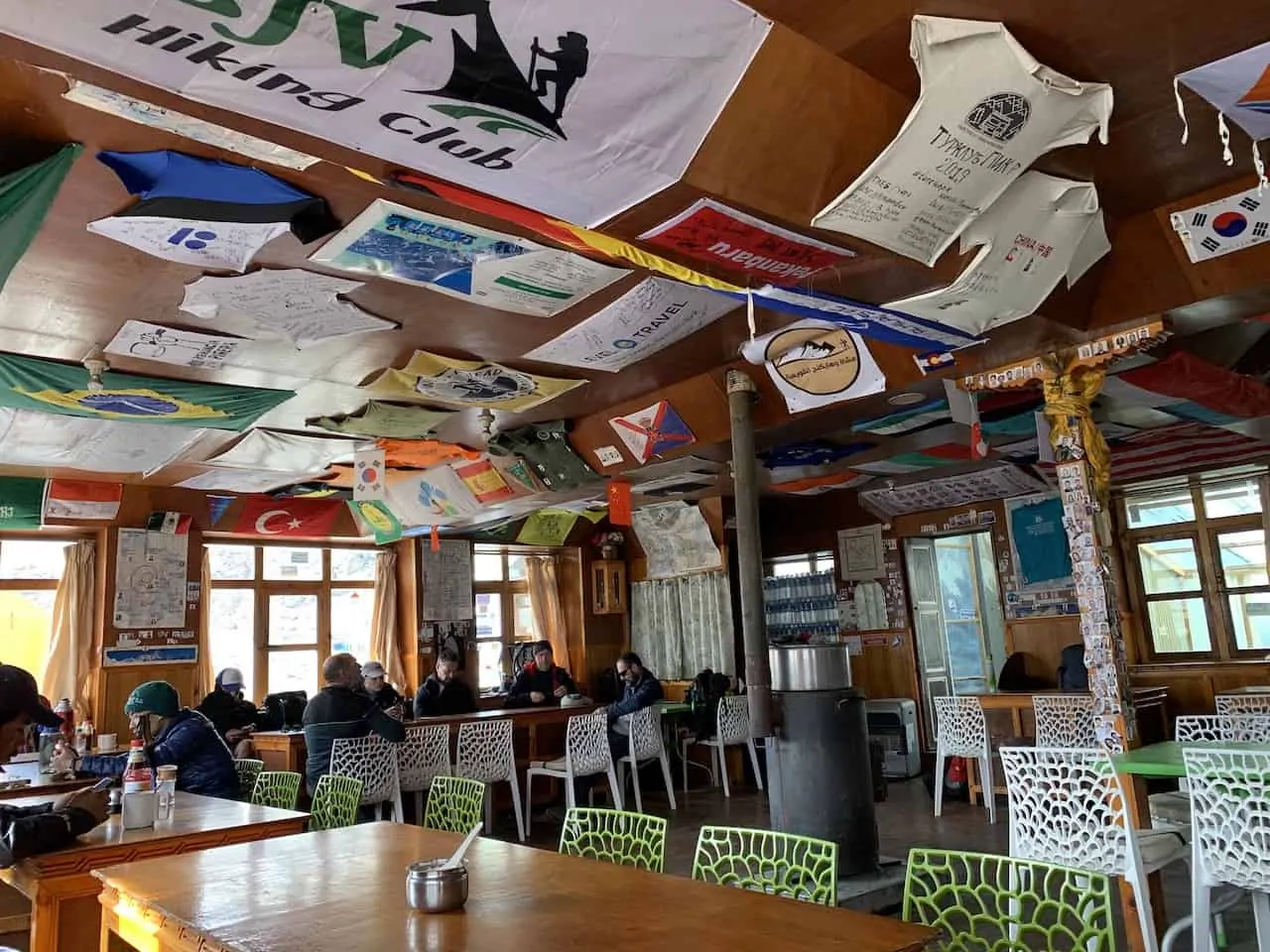
EBC Trek Food
Total Cost: $231 USD
Speaking of food, you can find a whole variety of it along the Everest Base Camp trek. Although you are in the middle of the Himalayas, there is still vast menu offerings at these teahouses.
During my trek I averaged around $21 per day (eating 3 meals each day). I should note that for every meal I purchased a tea and a main course. If you happen to want more appetizers, drinks or desserts, the costs will increase.
It is also important to note that the further you head up the valley, the more expensive items will be. That is because everything taken up the valley is done by porter or by animals. The further these porters or animals go, the more time/effort it will take.
Below are some prices for a lemon tea and a vegetarian dal bhat in each one of the villages (at the teahouses I stayed in). The prices are in Nepalese Rupee as I took them right from the menus.
Phakding | Rs 100 / Rs 550
Namche Bazaar | Rs 120 / Rs 580
Tengboche | Rs 130 / Rs 600
Dingboche | Rs 150 / Rs 700
Lobuche | Rs 160 / Rs 850
Gorak Shep | Rs 180 / Rs 850
Pheriche | Rs 150 / Rs 700
Lukla | Rs 100 / Rs 500
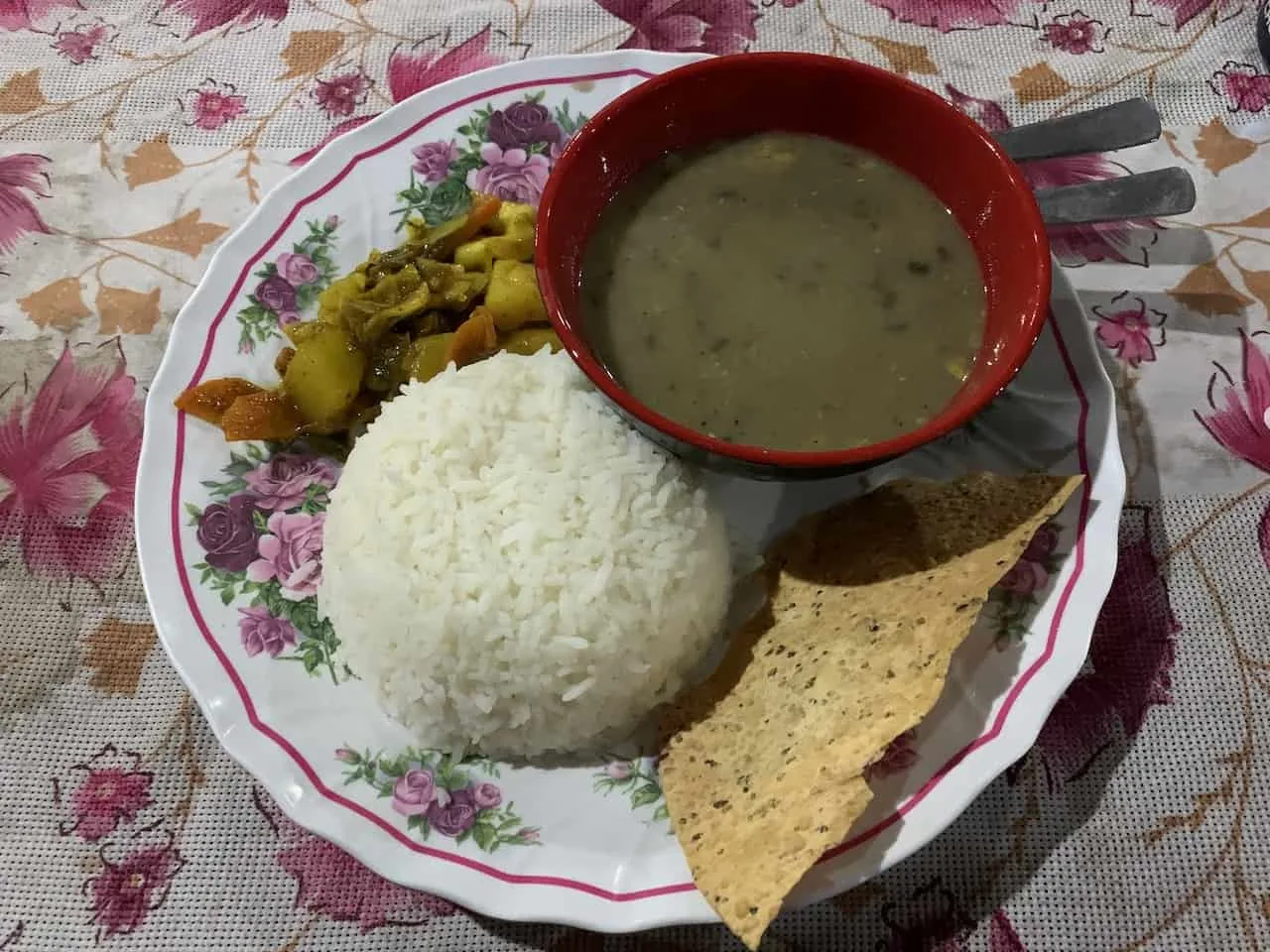
EBC Permits
Total Cost: $42 USD
When taking part of the Everest Base Camp trek, there are two permits that must be purchased along the route.
1) The Khumbu Pasanglhamu Rural Municipality Permit costs Rs 2000 / $17 USD and will be purchased on your first day on the trail just as you are leaving Lukla.
2) The Sagarmatha National Park Permit costs Rs 3000 / $25 USD and will be purchased on your second day on the trail between Phakding and Namche Bazaar.
Note that a TIMS card is no longer needed for the EBC trek. The above two should be everything you need to take part.
→ Be sure to keep these permits in a safe place throughout the trek as you will be asked for them at a couple checkpoints and on the way back out.
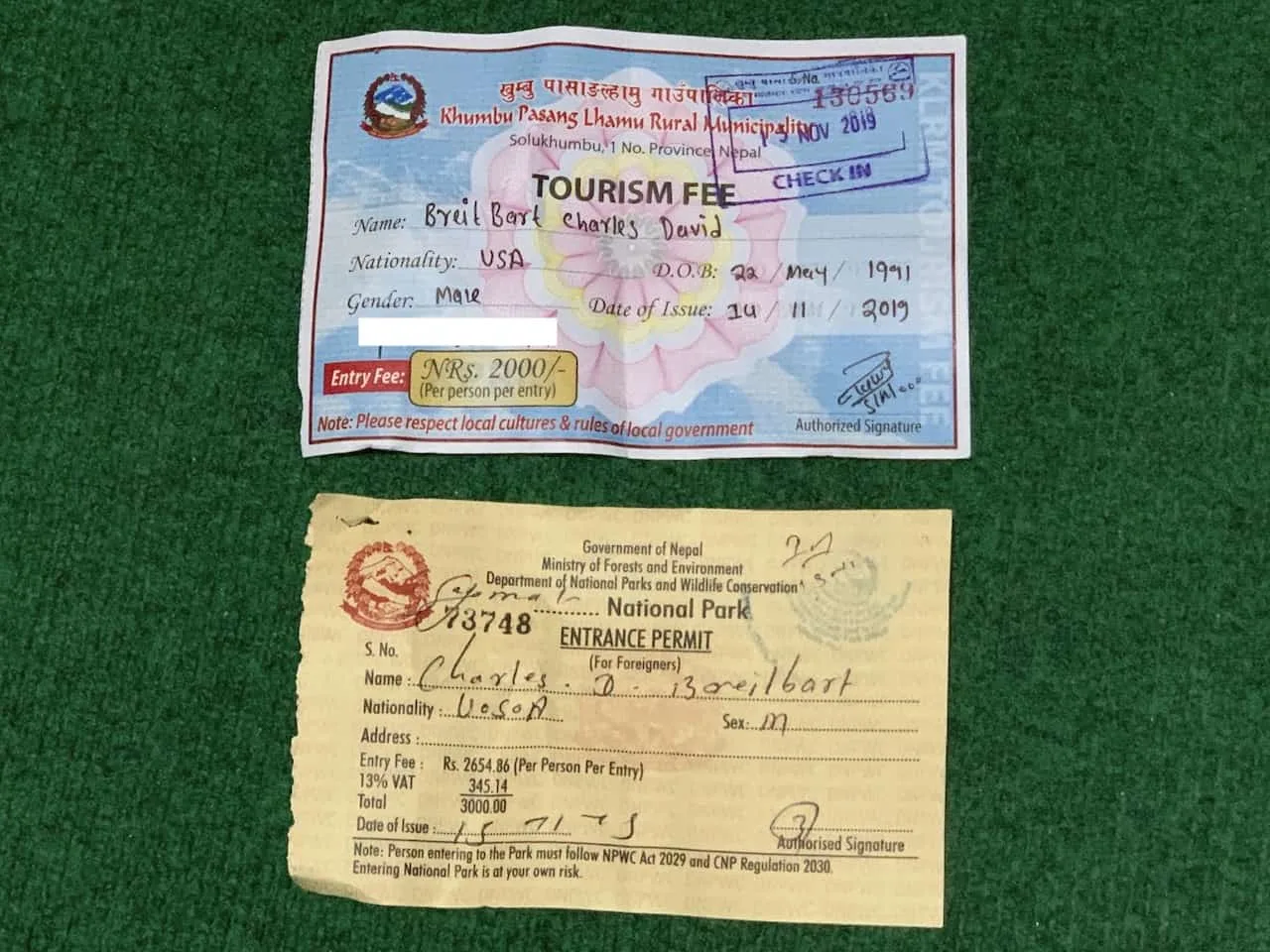
EBC Insurance
Total Cost: $180 USD (costs may vary)
You should not be taking part of the Everest Base Camp trek without purchasing appropriate travel insurance coverage. This is a trek where people can get sick due to the altitude (or have injuries along the way).
Paying out of pocket for an emergency evacuation could cost thousands of dollars. There is no reason not to purchase travel insurance to cover these costs in case of an emergency situation.
In addition to sickness/injury/evacuation, travel insurance also covers flight delays, cancellations, baggage lost, among many other important considerations.
World Nomads offers coverage for more than 150 adventure activities as well as emergency medical, lost luggage, trip cancellation and more.
For years, World Nomads has been protecting, connecting & inspiring independent travelers, offering travel insurance & safety advice to help you travel confidently. Their mission is to support and encourage travelers to explore their boundaries.
World Nomads has simple and flexible travel insurance that has been designed by travelers for travelers. Even if you leave home without travel insurance or your policy runs out, you can buy or extend out on the road.
Get a quote for a World Nomads travel insurance policy today!
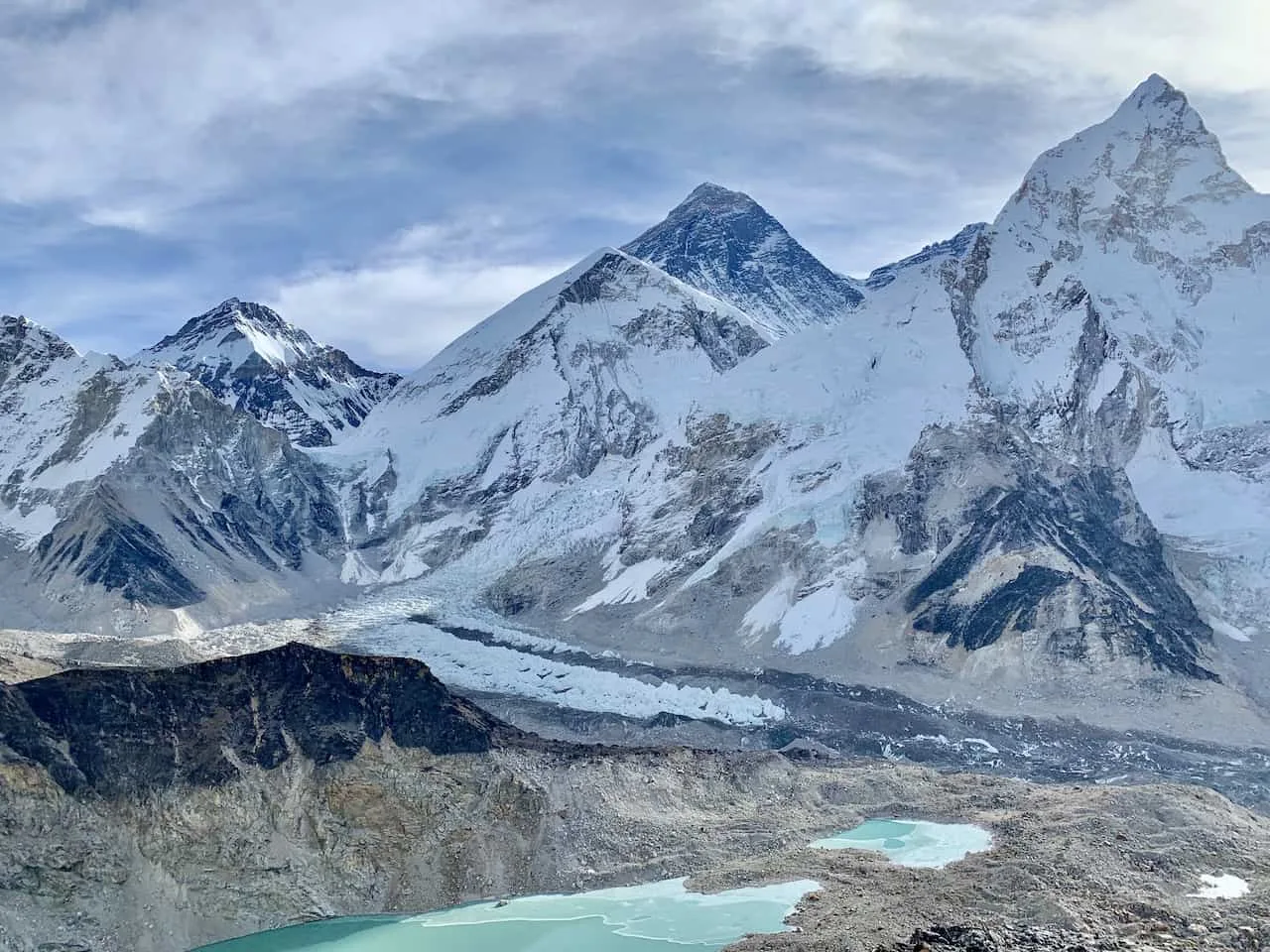
Charging Electronics
Now we get to the more “optional” costs when it comes to the EBC trek. The first of which is charging your electronics. If you come prepared with portable chargers and solar panels, you may not need to pay to charge anything during the duration of the trek.
However, if you do run out of power sources, then you can pay the teahouse to charge your electronics for you. Now, there won’t be outlets in your room. Instead you must give your electronics to the front desk of the teahouse and they will charge it for you.
This will also vary based on where you are on the trail but expect to pay around $4 for a phone charge, $6 for a camera charge, and $8 for a power bank charge.
Note: in Namche Bazaar they offered free charging so that can help you out a bit at the beginning and end of your trek.
Hot Showers
Another consideration you will have is whether or not you want to go 11 nights without showering. While you can use body deodorizing wipes or some cold water to wash up, some teahouses also offer hot (or warm) showers.
These do come at a premium, costing around $10 per shower. But it can sure be worth it after a long day of trekking.
Note that not all teahouses offer showers and that you may also find the option of just purchasing a hot bowl of water to help wash yourself with too (at a cheaper cost).
Internet
The last luxury of the Everest Base Camp trek is Internet connection. There are two ways to go about getting connected to the Internet during a trek – local SIM card or Everest WiFi.
In the Kathmandu Airport, I went ahead and paid $10 USD for an NCell SIM card that kept me connected in the city. In addition, I was able to get some Internet connection all the way up to the Tengboche/Pangboche area before it stopped working.
Everestlink
While the cell networks may not work further up on the trek, you do have the option to purchase a WiFi connection through Everestlink. Everestlink can be found at various teahouses throughout the region. So, if you purchase the WiFi, you can use your WiFi data throughout your journey.
You will simply just connect to the Everestlink network at your teahouse, put in your username and password, and be on your way.
Prices can fluctuate a bit for the WiFi, but expect around $6 for 1 GB, $20 for 10 GB, and $25 for 20 GB. You can buy these directly at teahouses along the trail.
Note that these extra amenities will most likely not be included even on a fully organized trek.
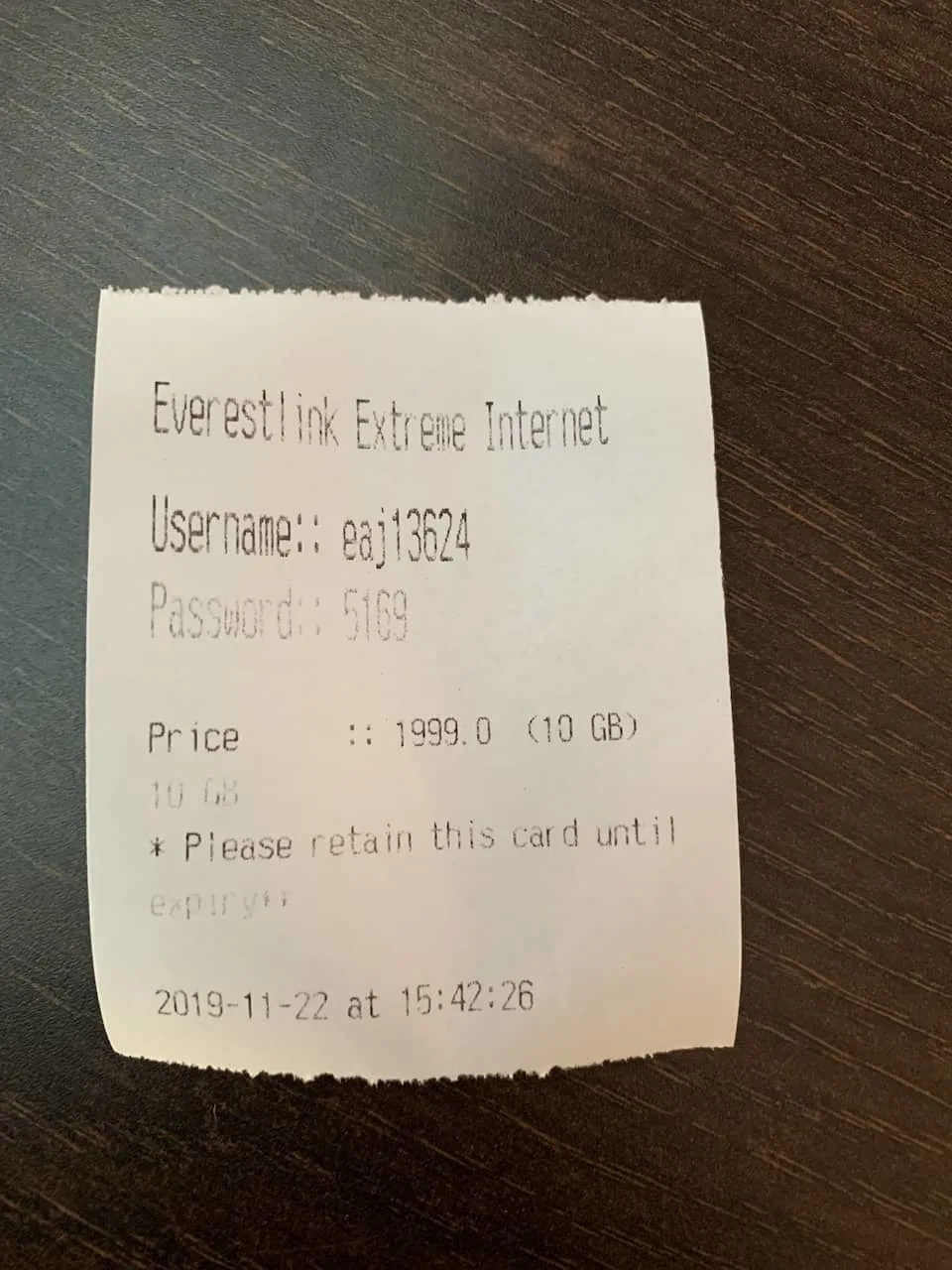
5) Packing List
Of course, no matter what option you choose from you will need to consider the costs of your Everest Base Camp trek packing list.
If you are already a frequent hiker and have many of the necessary gear items, then you may not need to worry about more costs.
However, if you need to buy gear for the trek, then your costs will certainly go up.
Although you may be spending some more money here, you can consider these items to be more of an investment over time.
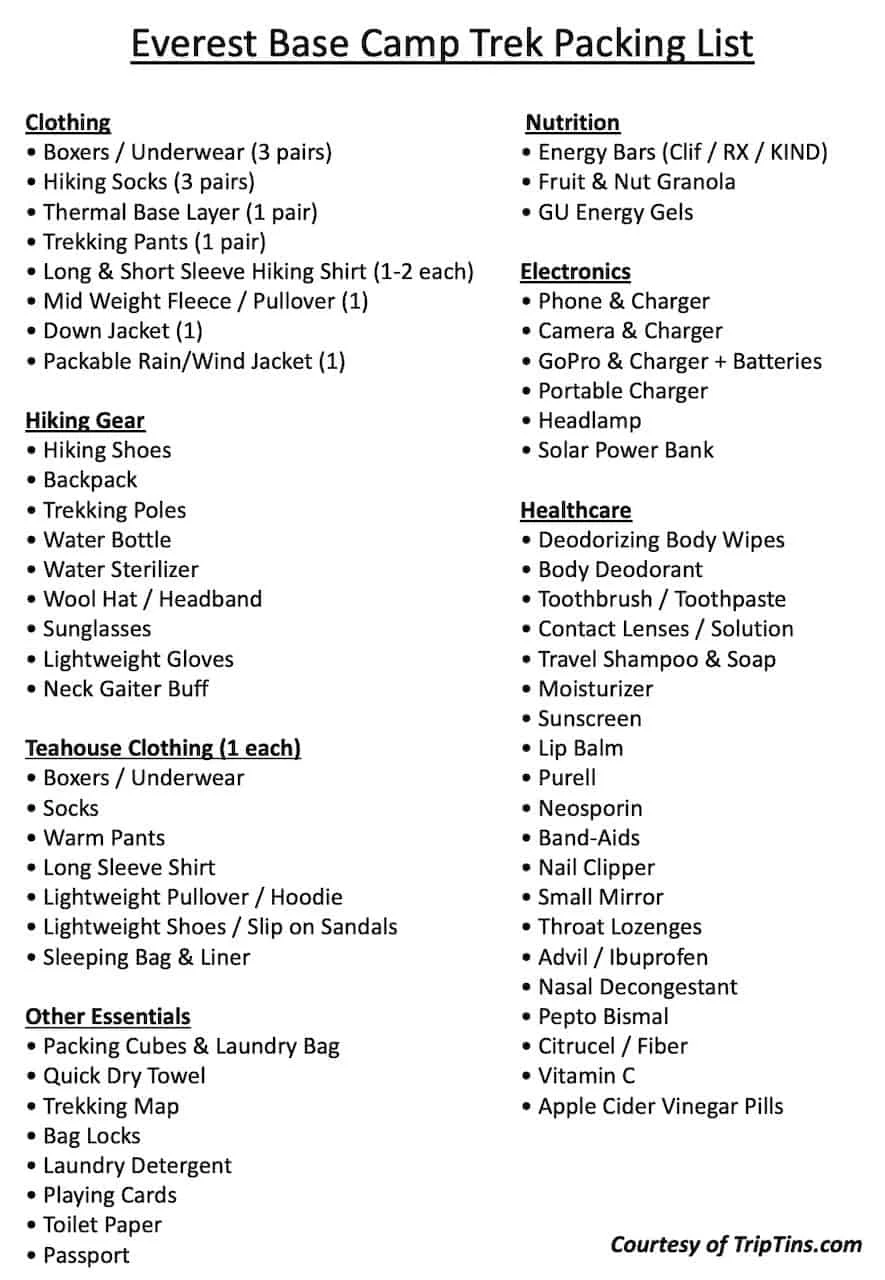
6) Everest Base Camp Cost Recap
So, to recap the Everest Base Camp cost, below you can find a breakdown of all of the costs mentioned above.
Nepal Visa: $30
Taxis to/from Airport: $32
Kathmandu Accommodation & Food: $135
Flight to Lukla: $360
EBC Trek Accommodation: $55
EBC Trek Food: $231
EBC Permits: $42
EBC Insurance: $180
Total: $1,065
Additional Amenities
→ Charging Electronics
→ Hot Showers
→ Internet
If taking part of an fully organized or semi supported trek, expect to pay around the following:
Full Organized Trek: $1500 -$2,000+ + Visa + Insurance
Independent Trek with Guide: $1,065 + $330 = $1,365
Independent Trek with Porter Guide: $1,065 + $220 = $1,285
Independent Trek with Porter: $1,065 + 165 = $1,230
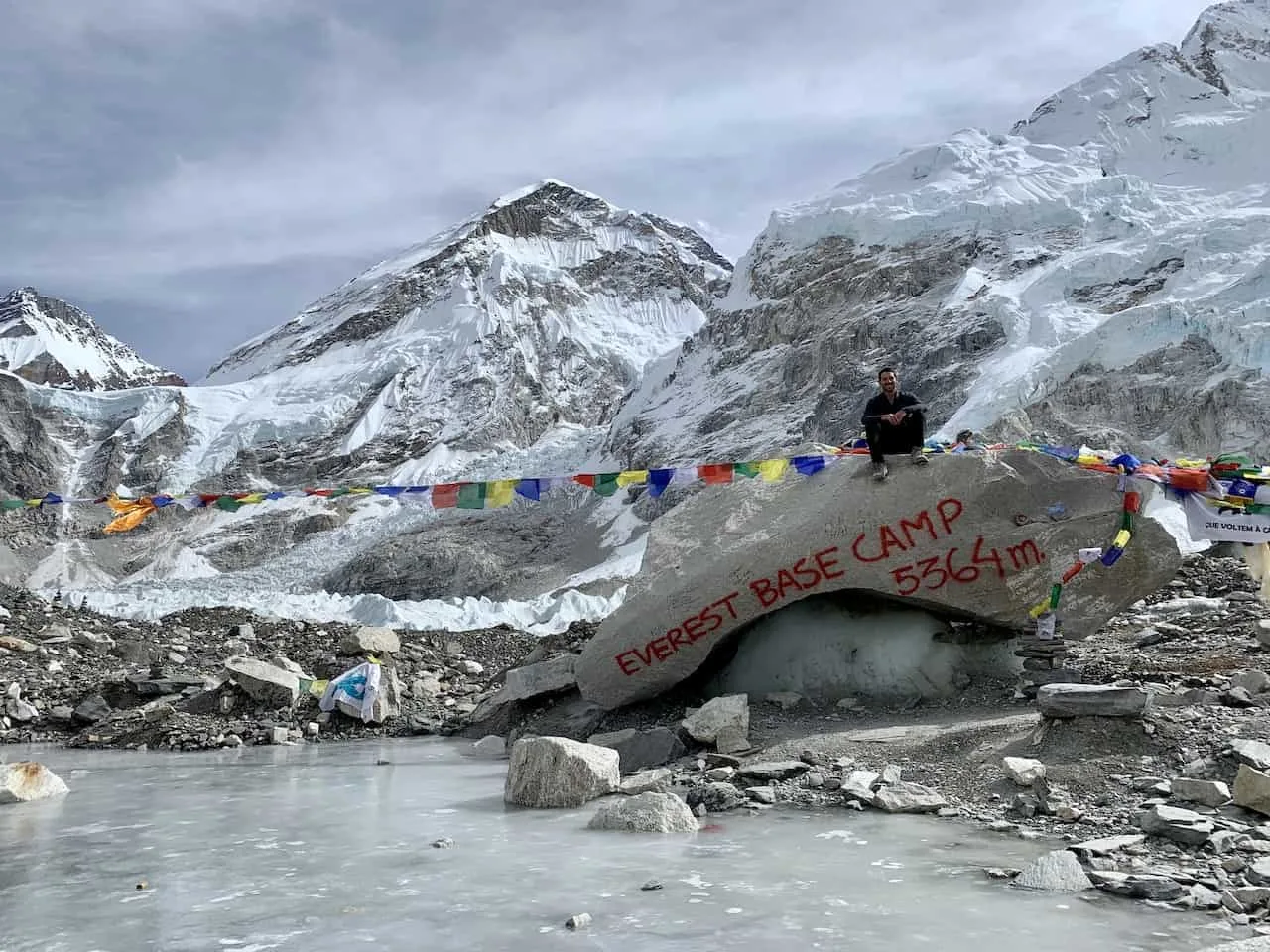
That about wraps up a guide to the Everest Base Camp trek cost. If you have any questions or comments about it, write them in below. Also, be sure to check out the other Nepal itineraries and guides up on the site.
Have fun out there and safe travels!
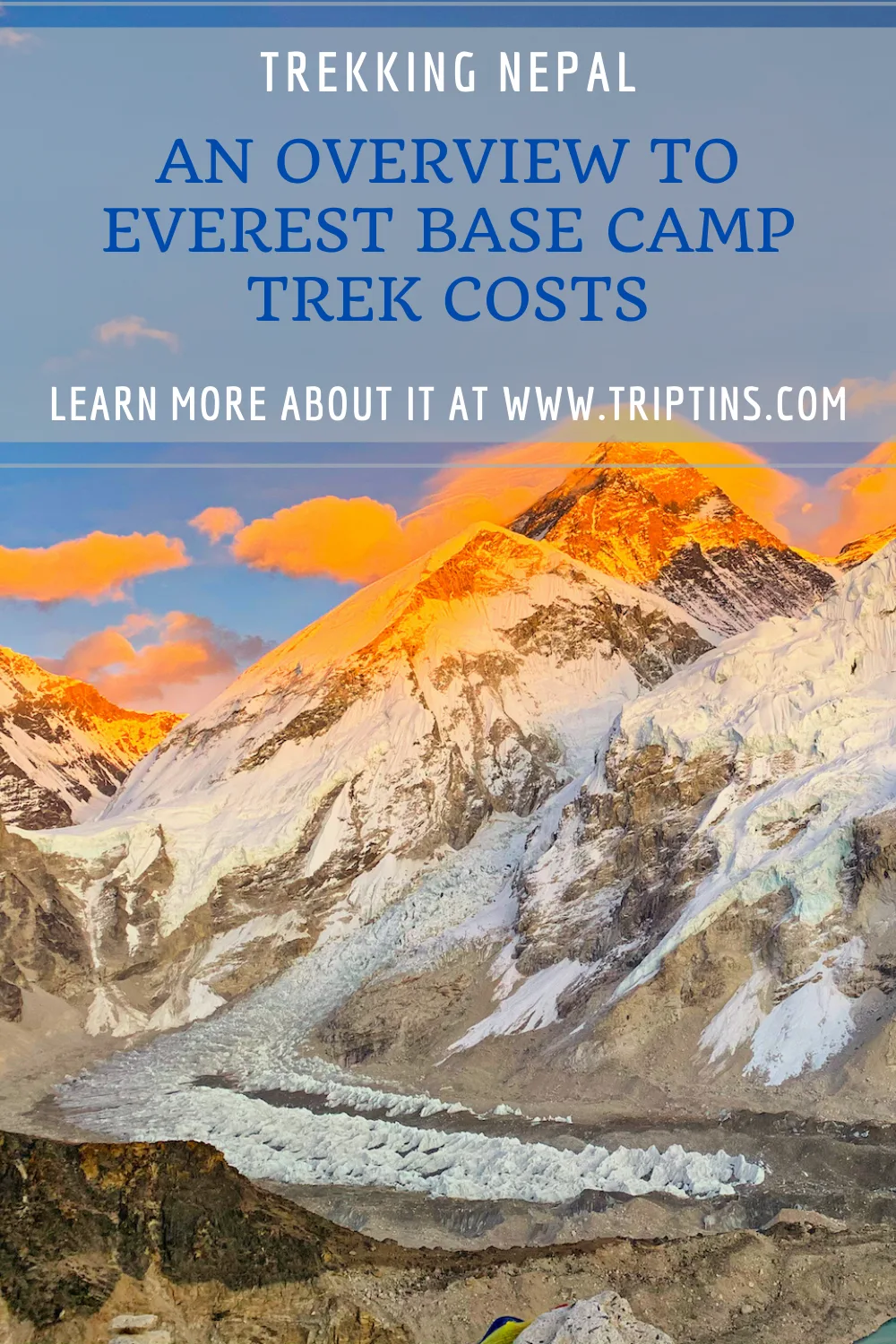
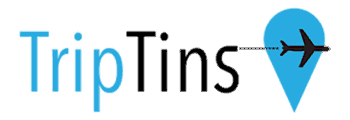
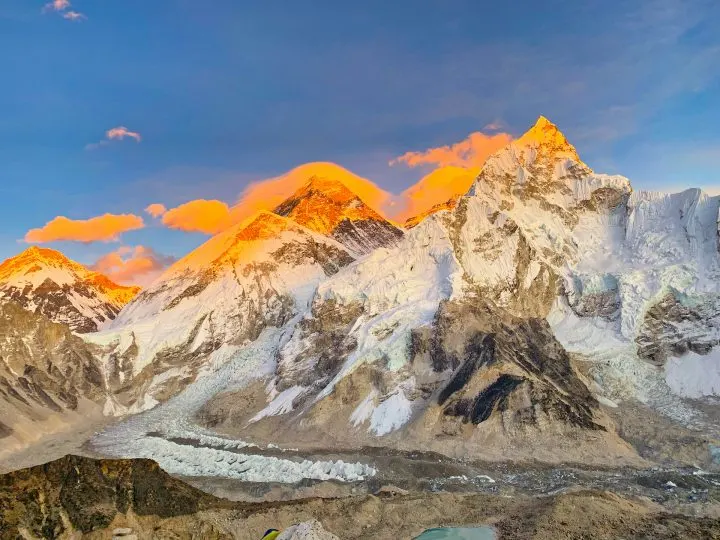
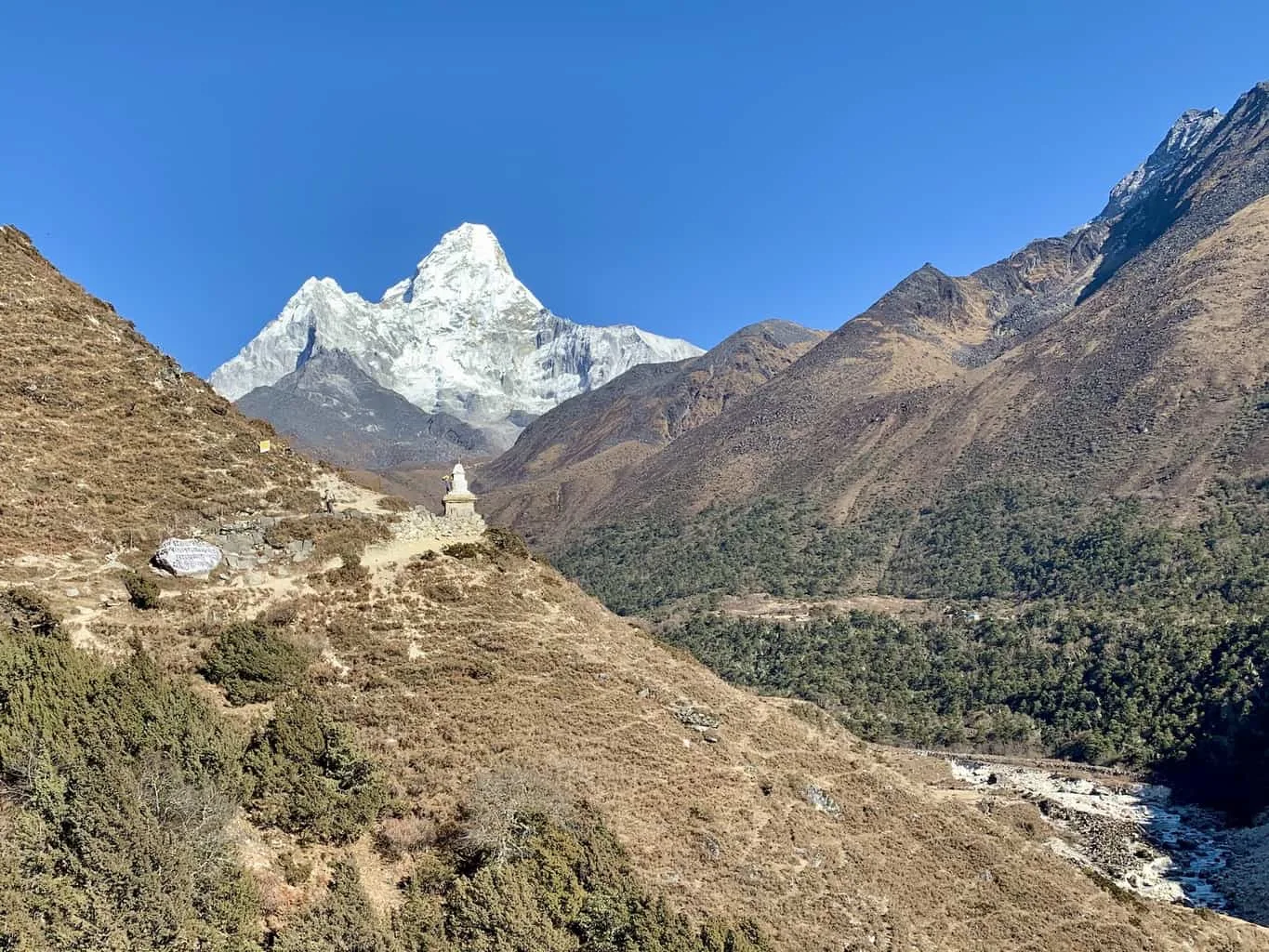
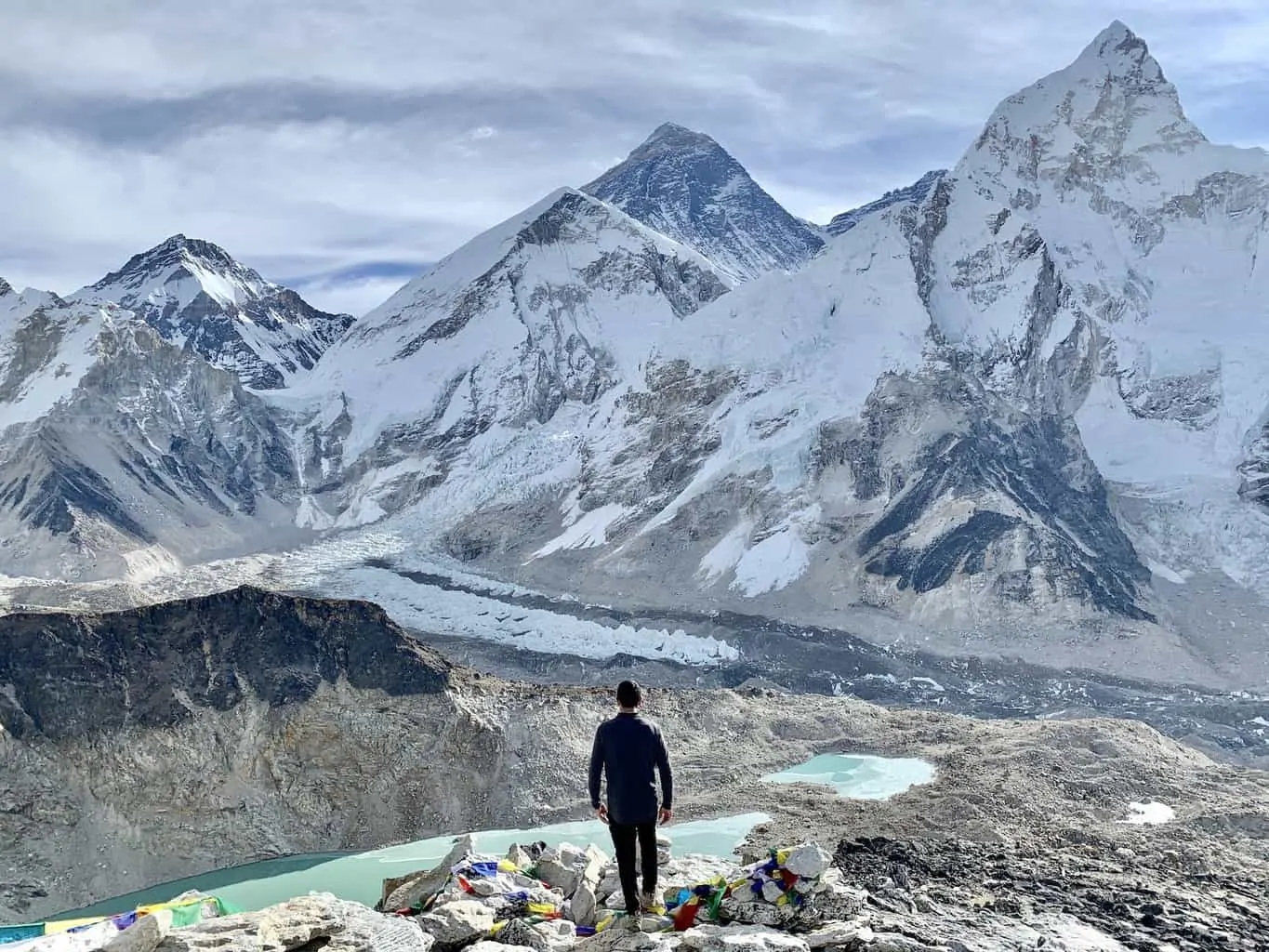
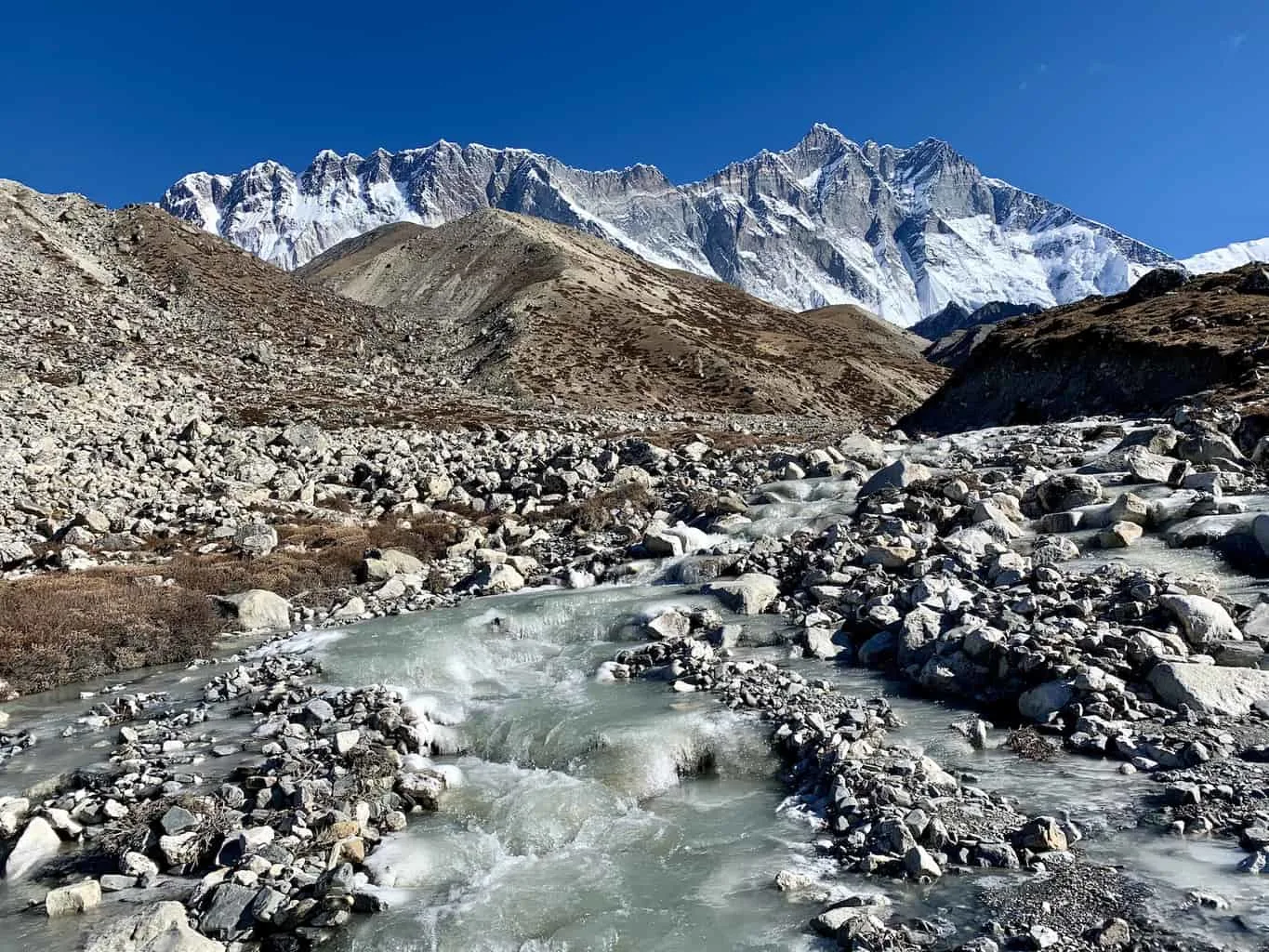
Tarun Pawar
Monday 4th of September 2023
Hello, I am a asthmatic person from India and i want to trek to Everest base camp. what precautions and medical preparations would you suggest me. how much base camp trek costs and how many days it takes.
Charles
Tuesday 5th of September 2023
Hi Tarun - I would recommend you take a look in the article for the particular costs. You can also learn much more in this Everest Base Camp overview I have written up.
Dan
Friday 14th of October 2022
Thanks! Planning the Three Passes from Jiri in a couple of weeks and this was helpful - great detail on prices and nice to see something recent for that.
Charles
Friday 14th of October 2022
Enjoy the trek! If you want to learn more about the Three Passes trek in general check out https://triptins.com/three-passes-trek/ for more